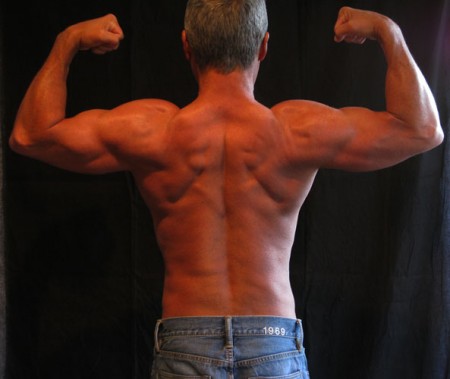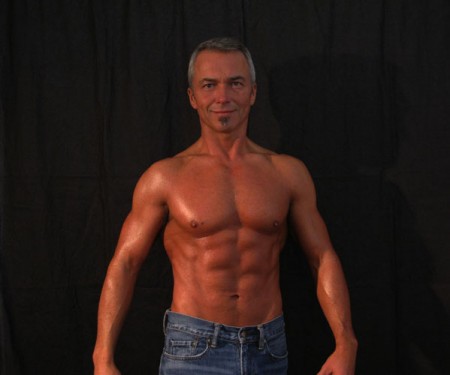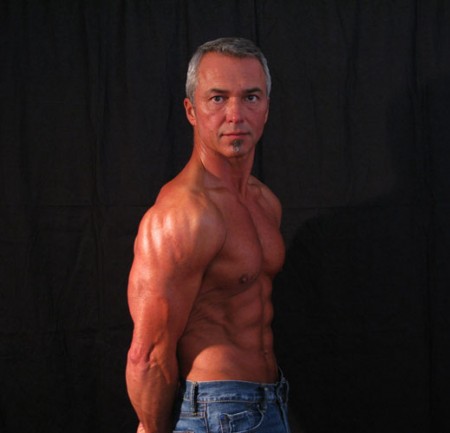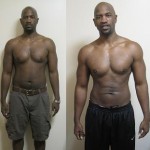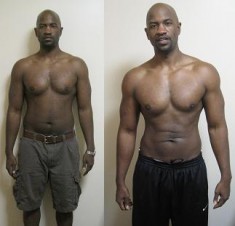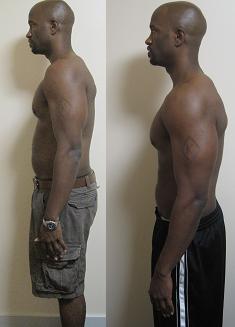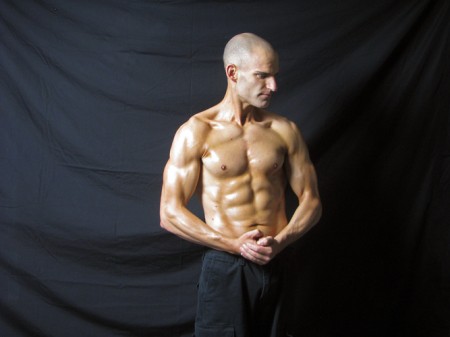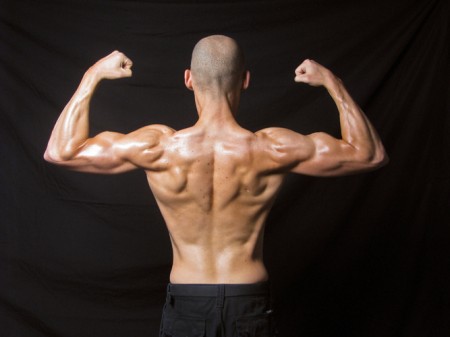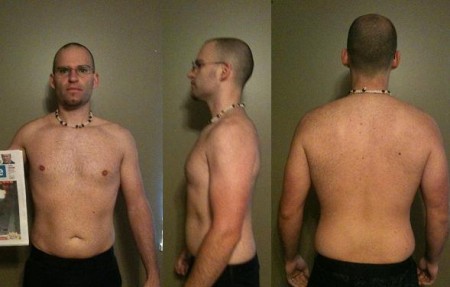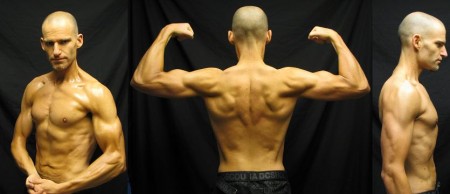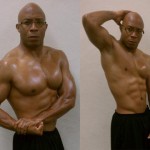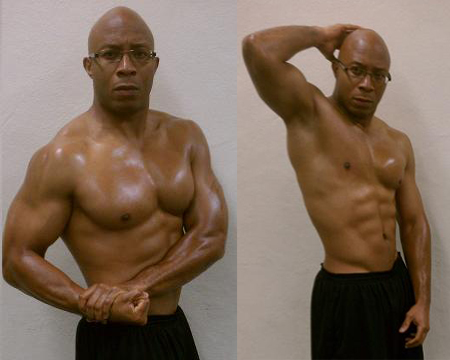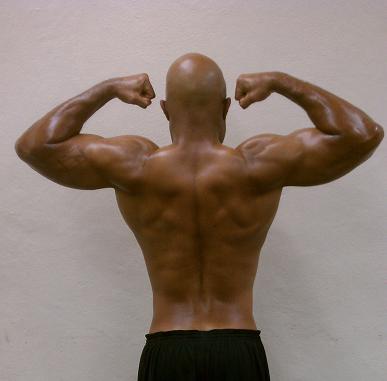Today we have an interview with Shan Hefley, who placed second in the Open category in the latest Adonis Index Contest.
Check out his photos:
“…I Just Wanted to Get Bigger, Then I Read Adonis Index.”
Shan started working out at an early age and since he gained some weight in college he dieted down and eventually got skinny. His weight fluctuated as the years passed. Being 5’7” lead to the conventional “wanna get big” guy mentality.
Shan never wanted to look like a bodybuilder, but since he didn’t have any specific goal, was skinny and had average height, he thought that getting bigger, and specifically ‘heavier’ would help him get a killer looking body.
He started working out, subscribed to several fitness magazines and read every issue.
He believed in everything they said. And he aimed for the look of the cover models.
After years and years of working out and following the advice from the fitness magazines, he stumbled upon the Adonis Index.
After countless visits and calculating his ideal proportions over and over again, he finally got on board and decided to get the program.
And it proved to be a pretty interesting concept. Shan like most of the guys never really thought about proportions or specific shape, it was always just about getting bigger.
Shan was fascinated by the idea of proportions. He also started understanding that a 5’7” guy can’t and even shouldn’t try to get to 200 pounds. He realized his genetic limits at his height wouldn’t let him reach a body weight of 200lbs unless it was due to an excess amount of fat or drug induced muscle growth.
This was quite a different concept compared to the articles in all the fitness magazines he was following till now. Which if you’ve ever read in the past, you know that there is not a word about proportions. Usually it’s headlines such as ‘100 new tips how to grow your bicep’ or a pitch for a new magical supplement that is supposed to help you pack on 30 pounds of muscle.
Since Shan has taken some art classes, it made sense to him that there is something more to it than just getting bigger at all costs and that it may not be about being big, but rather it’s about looking big, which if you don’t know are not the same things.
If you build a broad back, wide shoulder and a shredded waist then you will create an illusion of being bigger than you actually are.
Usually he is pretty skeptical, but the Adonis Index was so thoughtful and truthful he went right into it, after that he read Eat Stop Eat and everything just clicked.
Now he had tools both for building a specific shape and how to diet down to a low bodyfat.
He wasn’t fat nor did he feel like it, but it was remarkable that after skipping a few meals he could see big changes in muscle definition. Like he said, the bodyfat fell off pretty quickly. And in his own words:
“I discovered muscles I never knew were there and they were under a layer of fat I never knew I had”
There are lots of guys like Shan who are only 10 pounds from ripped, but they screw it up by trying to put on another 20 pounds of muscle. They fall for all the conventional fitness crap and pursue goals they can never achieve, which just results in spending money and effort to remain in the average, ‘ok shape’ looking zone. They just don’t know how close they really are…
Wearing a Big Shirt Doesn’t Mean You Are More of a Man
For Shan this wasn’t just a physical transformation, but also a mental one. A big part was that he went from wearing large to small shirts.
Smaller clothes now really fit him, just take a look:
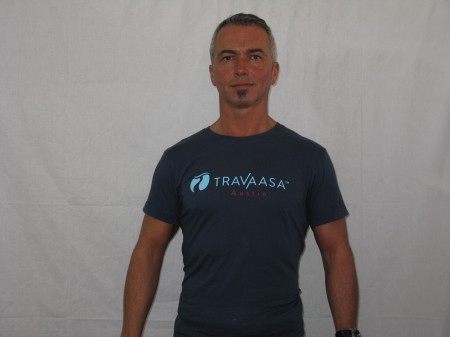
Don't you agree that this smaller size T-shirt really fits him? Can you say the same about your wardrobe?
What about you, do you have an issue with wearing a small T-shirt? Does it make you feel anxious?
Most guys can’t get over the fact that they look better in a small and fitted shirt. They almost think that just because they wear smaller size clothes it means they are not that manly and feel “emasculated”. This seems to correlate with the never ending pursuit of getting big at all costs.
Advice from Shan?
Dump that belief.
Wear what really fits your physique and shows it off!
It’s hard to accept it, but it’s really just a number on an article of clothing manufactured by someone who has never seen your body type…in reality that number doesn’t mean anything. If you are under six foot, then there is no reason for you to wear and extra large shirt. If medium seems to fit the best, then buy mediums only. And if you want to feel good about some number that would tell other people how you look, just focus on your AI number instead of your shirt size.
It’s just like body weight. What shows on the scale is just a number, it doesn’t indicate if you are healthy, or the proportion of your body. The truth is nobody knows how much you weigh either and nobody really even cares. The only one that is obsessed with it is you.
If it’s kind of hard to grasp right now, then don’t worry even Shan had big issues accepting this. On some days he was on a scale thinking that he should weight more, and was skeptical of losing weight, but he couldn’t argue with the numbers AI gave him. If the AI that is based on precise math is telling you that you are exactly where you are supposed to be, then you shouldn’t want to weigh any more and you shouldn’t try to weigh more.
Just like women think they need to be as light as possible and that men are only interested in a muscle-less tiny woman, men think of exactly the opposite. Just imagine a skinny woman without any shape, would you be attracted to her?
Probably not.
This is exactly the same and big guys without any proportion or shape.
That’s why the Adonis Index is so powerful. It gives you the proportions and goal to shoot for.
And like Shan said, you just can’t argue with the numbers. What looks visually appealing doesn’t necessarily translate to a specific and heavy weight.
Take home message from Shan
- Don’t be afraid to go light, give yourself the permission to be light
- It’s about the shape you will build and the measurements you will have, not the weight
- Aim for your ideal Adonis Index
- It’s not about building lots of muscle, but rather making specific muscles bigger, changing clothes and presenting yourself in the best way possible
- In pictures you look differently than you do in reality, that is why you need to play with tanning, lighting and posing a bit
- It’s possible to do Adonis Index workouts at home
- When you undergo a body re-composition, it doesn’t necessarily have to show up on the scale
- Remember that just a few pounds of muscle will make a big difference on a lean body
- It is about how you look, not how much you weigh or how much you can lift
- As you age, the changes take longer
Programs that Shan used to get in contest shape:
Adonis Index Workouts – Here are the original workout plans that have been responsible for some of the most amazing transformations online.
Eat Stop Eat – Pilon’s revolutionary lifestyle and diet protocol.
Adonis Index Community – You will never find a more supportive, outgoing, and RESULTS based community like you’ll find with the AI “Insider’s Club”.
Listen to the interview here:
Podcast: Play in new window | Download

